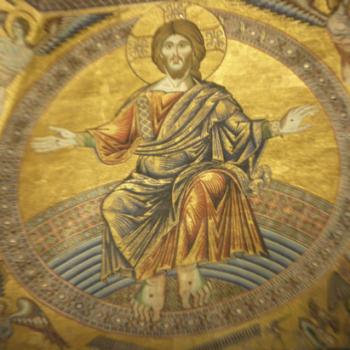 Christians must help the poor and must oppose injustice to the poor.
Christians must help the poor and must oppose injustice to the poor.
Stop.
Read it again. If you doubt it, then skim through the Old and New Testament and look for what it says about the poor and the rich. Do not let theologically progressive Christians, otherwise mired in irrelevance and decadence, have this truth.
Instead, we must always remember: statism kills, radical individualism kills. We say no to Nimrod’s statism and Cain’s individualism. Why? Injustice can take place in systems, such as state sponsored segregation in the South of the USA, or from individuals, as when the robber barons built factories that were unsafe and harmed workers. American Christians must reject radical individualism, we are part of a community, and we must also reject statism.
We refuse to say “I am Lord” or “Caesar is Lord.” If every man is Caesar, then we have simply multiplied tyrants. If we put all power in a state Caesar, then we have created anti-Christ.
Different eras have provoked different responses from Christians due to different needs. We have absolute moral principles (or should!), but can be flexible in applying them. American Christians have gotten this mostly right with the horrific exception of race.
There white Americans, Christians and otherwise, rarely have gotten it right. With that ignoble exception, American Christians have done well avoiding statism and individualism. It is not all about my rights, but it is also not all about the needs of the many running over top of my rights.
We need more government to check big business, but few Americans wanted “red” solutions.
The nineteenth century is a good test case. Christians like James Garfield, a former pastor, mostly favored business, but also wanted to clean up government. Yet the robber barons were making messes that the “hands off” policies were not helping. Workers like my Papaw, killed intentionally by Union Carbide, needed a powerful ally.
We knew socialism would not work and (mostly) rejected it. Instead, we sought less ideological middle ways: muddled mixes of pro-business, pro-working people policies. When business faced stagnation, we could turn to a Reagan to lift some of the load without repealing the New Deal that had mostly helped people.
What about the New Deal?
Overwhelmingly, it was traditional Christians who made the New Deal (0r early progressivism) possible. This was the culmination of a long fight. When Theodore Roosevelt’s Bull Moose Party left the convention singing Onward Christian Soldiers, they were reaching out to the old Bryan Western and Southern Christian voters and the Republican evangelical Protestant base. The Bull Moose lost and then died before he could win the 1920 nomination and finish the job himself. Instead, another Roosevelt was on the Democratic ticket and would later complete his agenda.
Franklin Roosevelt’s New Deal could not have passed without the support of traditional Catholics in urban areas and fundamentalist Protestants in the South. At the same time, opposition to the growth of the state was also led by religious people worried about four terms for one man, a cult of personality, and sketchy success in many programs. Social Security mostly worked, but many other programs were costly dudes.
Traditional Christians were key to both sides. How could this be true? For almost all of American history, traditional Christians have been a super-majority. That means most of the votes for the “right” and “left” have come from Christians.
This reflects the fact that how best to help the poor is a matter of controversy. For example, the more progressive political wing of conservative (theologically) Christians saw a bad social problem harming women and children. They worked hard to pass legislation, fighting massive corporate opposition, and this led eventually to a Prohibition amendment banning the sale of alcohol. This experiment had mixed results, some good was done, but mostly Christians decided that the cost in the growth of police power to stop boot-legging was too great. Of course, many traditional Christians (especially Catholics) had opposed Prohibition.
Progressive policy did not always work.
On the other hand, Christians spearheaded child safety laws and protections for workers. Few not of the fringe supported repealing those successful state intrusions into private enterprise. They can even be justified as saving free enterprise by deflating revolutionary sentiment. Good free market Christians also argue that passing off costs on the community for behaviors like pollution or unsafe conditions is unjust and so support such regulations.
How much regulation is too much? Prohibition was too much. Statism, government control of everything, has a disasterous economic history and is obviously too much. Christians want people to get health care, education, and be protected from crime. However, we also know that too much “free stuff” chokes the economy and innovation.
So like all Christians, I am in the school of souls working to reach adulthood by deciding how best to bring liberty and justice to all. Small government has merits. Liberty works and our more liberty oriented regime has created great prosperity for all, not just the rich.
I do not favor “single payer” health care, because I think the people who run the military should not also run medicine. Instead, I support “mixed” systems like those in Singapore or proposed by Mitt Romney. I am not for “free college,” because I am convinced that this would bloat administration, not improve quality. Generally, I support smaller government than we have, but wish we could end corporate welfare (such as sugar subsidies).
Of course, I might be wrong. Perhaps somewhat more government spending would help more people than it would hurt. I am not convinced. Instead, I think we are in a moment when government is too much in bed with big business and should stop picking corporate favorites: shrink it.
I am a traditional Republican, not because I think Christians must be, but because historically, people like Lincoln, Grant, Roosevelt, Ike, and Reagan, were better at finding the right balances. Yet still the good done by Democrats like FDR (winning World War II) or Truman (setting up the Cold War consensus) shows that not all virtue is in one party.
Let’s keep muddling along, opposing cults of personality, statism, lies, and also the radical individualism of monsters like Ayn Rand.











